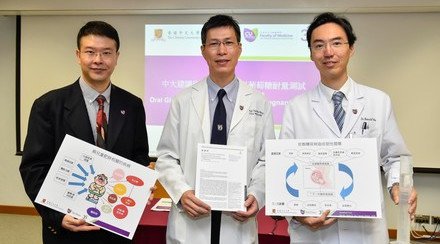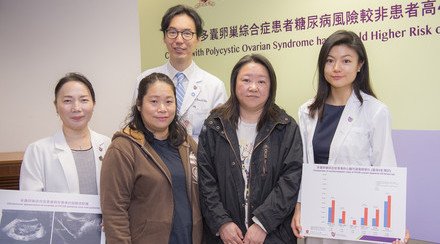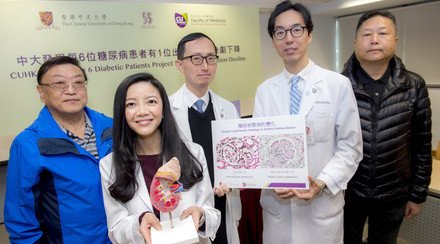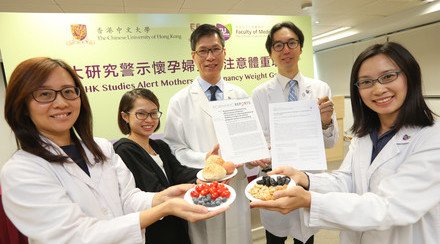CU Medicine Researchers Discover Shortened DNA Telomere Length as a Useful Biomarker to Identify Patients with Diabetes at High Risk of Cardiovascular Disease
A large cohort study conducted by the Faculty of Medicine at The Chinese University of Hong Kong (CU Medicine), in collaboration with investigators from the University of Sydney, Australia, has discovered that shortened DNA telomere length is a useful biomarker linked to a higher risk of developing cardiovascular disease in patients with type 2 diabetes.
The Endocrinology and Diabetes team of CU Medicine evaluated this biomarker in over 5,300 type 2 diabetes patients during a 13-year follow-up period. Patients with cardiovascular disease at baseline or during follow-up had shorter tail-ends of DNA strands, expressed as relative Leukocyte Telomere Length (rLTL), than those who never had cardiovascular disease. For each unit relative decrease in rLTL, the risk of cardiovascular disease increased by 25%. These results have been published in the leading diabetes journal, Diabetes Care.
Shortening of the tail-end of DNA strands (telomere) is associated with cellular aging
Patients with diabetes have two to four times higher risk of cardiovascular disease than those without diabetes. Elevated blood glucose, blood pressure, and blood lipid levels as well as obesity, smoking, and reduced kidney function are major risk factors of cardiovascular disease in diabetes patients. CU Medicine has reported that 15% of type 2 diabetes patients attending Hospital Authority clinics had a prior history of cardiovascular disease during assessment, with another 15% developing cardiovascular disease after an average of 6.7 years of follow-up.
The DNA strands contain the genetic codes of an individual which determine his/her unique traits and predisposition to various health conditions. Telomere is the tail-end of DNA strands which contain a repeat code sequence that shortens with each cell division. Loss of these repeat sequences is associated with shortening of telomere length which indicates cellular aging.
25% higher risk of cardiovascular disease for each unit decrease in DNA telomere length
Diabetes is associated with an abnormal internal environment which increases the risk of cellular aging and cardiovascular disease. To evaluate the role of shortened DNA telomere length in predicting the risk of future cardiovascular disease in patients with diabetes, the Endocrinology and Diabetes team at CU Medicine studied the data of 5,349 patients with type 2 diabetes from the Hong Kong Diabetes Register, established in 1995.
The research team measured rLTL in DNA extracted from white blood cells (leukocytes) at baseline and analysed their associations with the occurrence of clinical events by June 2017. At baseline, 808 patients had a prior history of cardiovascular disease and during the 13-year follow-up, 1,140 developed cardiovascular disease. Compared to those who never had cardiovascular disease, affected patients had shorter rLTL at baseline after adjusting for other risk factors. For each unit decrease in rLTL, the risk of developing cardiovascular disease was increased by 25%.
Study results are as follows,
rLTL at baseline (unit) of subjects with cardiovascular disease
| rLTL at baseline (unit) of subjects without cardiovascular disease
| |
Comparison at baseline (no. of patients with cardiovascular disease = 808; no. of patients without cardiovascular disease = 4,541) | 4.3 ± 1.2 | 4.6 ± 1.2 |
Comparison during follow-up (no. of patients with cardiovascular disease = 1,140; no. of patients without cardiovascular disease = 3,401) | 4.3 ± 1.2 | 4.7 ± 1.2 |
(Mean±standard deviation)
Professor Ronald Ching Wan MA, Head, Division of Endocrinology and Diabetes, Department of Medicine and Therapeutics at CU Medicine, and Principal Investigator of the study remarked, “Our study demonstrated shortened rLTL was not only associated with a past history of cardiovascular disease, but also independently predicted the future risk of developing cardiovascular disease. This makes rLTL a useful biomarker for identifying individuals with type 2 diabetes who are at high risk of developing cardiovascular disease for intensive control of other modifiable risk factors.”
Professor Juliana Chung Ngor CHAN, Chair Professor of Medicine and Therapeutics and Founding Director of the Hong Kong Institute of Diabetes and Obesity at CUHK, added, “Chronic low grade inflammation associated with diabetes and obesity can cause oxidative stress which can accelerate aging. We are currently conducting further studies to validate the use of rLTL as a biomarker to predict other diabetes complications, such as kidney disease, which are the leading causes of hospitalisations, disabilities and premature death, worldwide.”
The project was supported by the Research Grants Council Theme-based Research Scheme, Research Impact Fund, and other funding support.

















